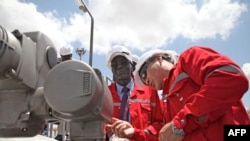PALOCH, SOUTH SUDAN —
South Sudan says it has resumed one-third of its oil production, which it shut down last year, and will export its first cargo next month.
Oil Minister Stephen Dhieu Dau pushed a button Sunday to resume production at the new nation’s main oil field in Upper Nile state.
“This is really a great day for the people of South Sudan. The official resumption of production in Paloch oil field, and we will be pushing the oil from South Sudan to the pipeline in South Sudan within two weeks, we are expecting it,” Dau said.
Black smoke billowed into the bright sky, signaling the restart of pumps that have lain dormant since January 2012, when a dispute with Sudan over transit fees led the South to halt production. Weeks of border fighting followed, threatening to bring the two sides back to all-out war.
But a deal was reached in March for South Sudan to pay around $10 per barrel to export via the north. South Sudan resumed production last month in neighboring Unity state with just 8,000 barrels per day production.
Dau said 180,000 barrels from Paloch should be flowing by next month and be exported from Port Sudan.
“So in the third week of June, we will be lifting the first cargo in Port Sudan, so thank you and I would like to congratulate the people of South Sudan,” Dau said.
Dar Petroleum Operating Company president Joseph Potdung said that after a painful wait, the Chinese-Malaysian-Indian consortium was pleased to be back in business.
“This is the biggest producing oil field in South Sudan and our success in terms of the resumption, will surely bring a lot of benefit as well as make a lot of difference to the people of this nation,” Potdung said.
South Sudan’s Justice Minister John Luk Jok said the months of negotiations with the north were difficult, but the resumption meant peace and prosperity on both sides.
“It was not easy. It took us quite a long time, to negotiate with Khartoum, or Sudan, in order to agree that we can still balance economic relations with Khartoum for the mutual advantage of both countries,” Jok said.
Oil revenue provides 98 percent of South Sudan's revenue and Finance Minister Kosti Manibe said until the oil money refills the state’s empty coffers, there will be a freeze on spending.
“We are just about the seeing the end of austerity measures, some of you call it “Kosterity,” that corner is still, we have not yet turned it. I will not tell you here how far away it is, I will do that only when the money has come back,” Manibe said.
Other officials urged the oil companies to provide more environmental and social benefits to the surrounding communities, while pledging revenues would trickle down to the people.
Oil Minister Stephen Dhieu Dau pushed a button Sunday to resume production at the new nation’s main oil field in Upper Nile state.
“This is really a great day for the people of South Sudan. The official resumption of production in Paloch oil field, and we will be pushing the oil from South Sudan to the pipeline in South Sudan within two weeks, we are expecting it,” Dau said.
Black smoke billowed into the bright sky, signaling the restart of pumps that have lain dormant since January 2012, when a dispute with Sudan over transit fees led the South to halt production. Weeks of border fighting followed, threatening to bring the two sides back to all-out war.
But a deal was reached in March for South Sudan to pay around $10 per barrel to export via the north. South Sudan resumed production last month in neighboring Unity state with just 8,000 barrels per day production.
Dau said 180,000 barrels from Paloch should be flowing by next month and be exported from Port Sudan.
“So in the third week of June, we will be lifting the first cargo in Port Sudan, so thank you and I would like to congratulate the people of South Sudan,” Dau said.
Dar Petroleum Operating Company president Joseph Potdung said that after a painful wait, the Chinese-Malaysian-Indian consortium was pleased to be back in business.
“This is the biggest producing oil field in South Sudan and our success in terms of the resumption, will surely bring a lot of benefit as well as make a lot of difference to the people of this nation,” Potdung said.
South Sudan’s Justice Minister John Luk Jok said the months of negotiations with the north were difficult, but the resumption meant peace and prosperity on both sides.
“It was not easy. It took us quite a long time, to negotiate with Khartoum, or Sudan, in order to agree that we can still balance economic relations with Khartoum for the mutual advantage of both countries,” Jok said.
Oil revenue provides 98 percent of South Sudan's revenue and Finance Minister Kosti Manibe said until the oil money refills the state’s empty coffers, there will be a freeze on spending.
“We are just about the seeing the end of austerity measures, some of you call it “Kosterity,” that corner is still, we have not yet turned it. I will not tell you here how far away it is, I will do that only when the money has come back,” Manibe said.
Other officials urged the oil companies to provide more environmental and social benefits to the surrounding communities, while pledging revenues would trickle down to the people.




